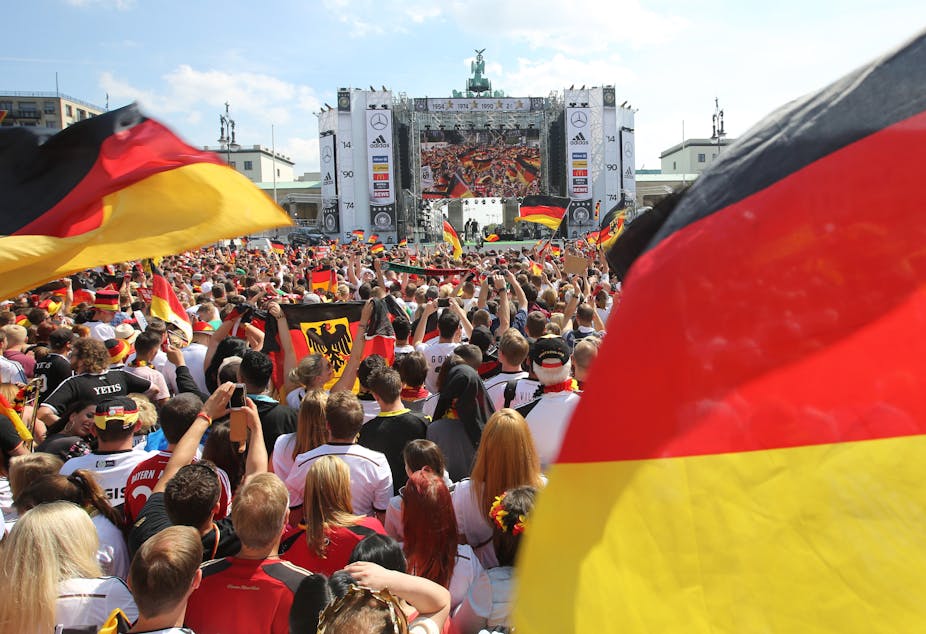The German football team returned from its victorious World Cup campaign in Brazil to a rapturous welcome. Hundreds of thousands of Germans gathered in Berlin to celebrate the first World Cup win for a united Germany since 1990. In many ways, it was a victory that reflects a broader pattern of German success, status and positioning in international relations. But more than that, this World Cup victory has been a triumph of healthy patriotism.
This collective pride that’s felt through supporting the national football team and celebrating their exploits on the pitch signifies a profound and important shift away from collective German feelings of shame about the World War II.
As a visitor to the divided Berlin in 1988, reunified Germany in the early 90s and as a Research Fellow at the Alexander von Humboldt Foundation in 2007, I have seen first-hand the many changes Germany has gone through since its reunification. This is nowhere more evident than at the Brandenburg Gate.
Once a symbol of a divided Germany, patrolled by East German soldiers with machine guns because the Berlin Wall ran past it, it is now the backdrop to a fan zone that held more than 300,000 people for important games. Giant TV screens have entertained crowds and created a party atmosphere during UEFA Euro and FIFA World Cup competitions since 2006. The huge crowds break into wild scenes of celebration when the national team does well. The good feeling generated has earned the title “party patriotism”.
A team to be proud of
For many Germans, the national team (also known simply as the National Eleven or “Elf”) is an embodiment of the modern nation – cosmopolitan and dynamic. The composition of the team reflects the multicultural nature of German society, with names like Özil and Khedira interlinking with Lahm, Schürrle and Schweinsteiger. And, the team’s attacking, high tempo playing style represents for many Germans a transformation of the dour and methodological national teams of the 70s and 80s, which is to be celebrated. The modern German team’s positive changes may have the power to weaken the kind of nationalism that is built around negative attitudes toward ingroup minorities, as has been found in previous studies of German citizens.

These changes are evident in the way that the German teams have sung the German national anthem and celebrated previous wins in 1954, 1974 and 1990. The effects of the country’s collective shame meant that outward celebrations tended to be muted in the past. The use of German national colours has also previously been limited among supporters because of their strong connections with right-wing nationalism and prejudice towards outsiders. This is most evident when you contrast the use of flags by citizens of Germany and the USA. But for Germans since the success of the 2006 World Cup, there has been a much higher degree of freedom in outward displays of national feelings.
The German win in 2014 hopefully continues a trend in which the celebrations of significant international football victories are largely positive and reflect cosmopolitan values rather than collective hubris and arrogance. The determination to avoid collective hubris is evident in the strong interest that many Germans take in reading about how other countries interpret German success.
Record viewing figures
The significance of the World Cup and widespread enthusiasm for it is also reflected in the staggering numbers that watched the games. In a population of 82m, Germany’s third group game against the US was watched by 27.3m, the Algeria round of 16 game was watched by 28.2m, the quarter-final game had “only” 26.3m viewers, the semi-final game Brazil against Germany was watched by 32.6m and the final was watched by a new record of 34.7m people. Although these figures suggest that less than half of the German population watched the final, the actual viewing figures are significantly higher because millions more watched the game in restaurants and at public viewing sites such as at the Berlin “fan mile”.
The story these figures tell is that the national football team has provided a collective focus for German national pride in a way that few other events can. My own experience of the euphoria and celebrations in Berlin during the 2008 UEFA Euro competition – where Germany lost in the final to Spain – reinforced the feeling that the performances of the national team provide a sense of community for many people that rivals other sources of pride and belonging. In 2006, a better than expected third place for Germany and successful hosting of the competition produced widespread national pride and collective euphoria, as well as improved economic perceptions and expectations. Similar but stronger effects are likely to follow the 2014 victory.
So, while research into emotion indicates that the positive collective emotions of World Cup success will fade in the next few days, it is important not to underestimate the impact of the World Cup as an event that lives on in stories of Germany as a successful nation. These stories provide a source of resilience during bad times and a reminder of high standards as the German team plans to contest the 2016 UEFA Euro qualifiers and defend its title in Russia 2018.
Naturally, it is important, also for the German team and its supporters not to plan too far ahead and simply to enjoy the moment of their national success. The team’s homecoming celebrations are rightly being perceived as enjoying a moment of history by supporters and bystanders who have been caught up in the month long carnival of emotion.

